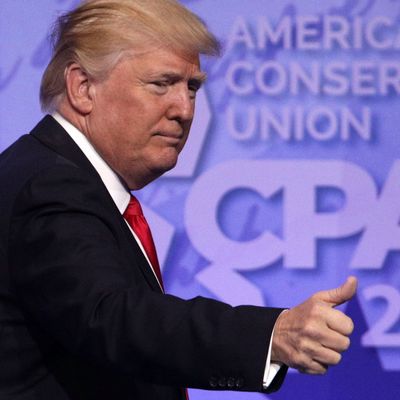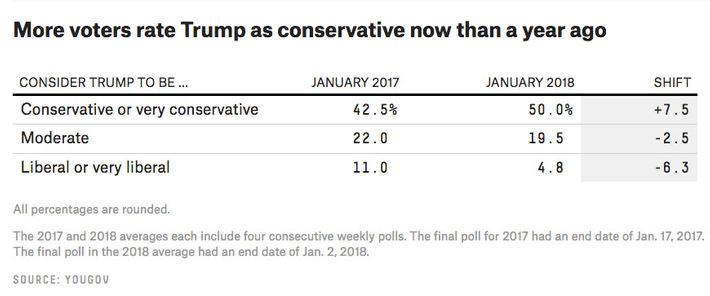
Virtually anyone who has made a living watching politics during the Trump era would agree that the famously unorthodox 45th president has in most important respects governed as a standard-brand conservative Republican. Tweets and tirades aside, he did, after all, devote most of 2017 to two classic conservative legislative causes —repealing Obamacare and cutting taxes for corporations and wealthy individuals. And beyond that, his accomplishments were limited to progress on far and away the most beloved non-legislative causes from the right’s point of view: revoking regulatory restraints on businesses and placing carefully vetted conservatives in lifetime federal judgeships, including on the Supreme Court. He did virtually nothing, moreover, on the elements of his campaign platform that were ideologically heterodox, as Jonathan Chait pointed out in September:
Trump has done nothing on trade, has abandoned his plan to spend a trillion dollars on infrastructure, has thrown his support behind any repeal or rollback of Obamacare that Congress could pass (which turns out to be nothing), is trying to pass the largest regressive tax cut possible, and has diligently slashed regulations on business.
While this observation about Trump has become commonplace, what’s interesting is the evidence that regular folks are sharing it, as Harry Enten notes:
Since before Trump took office, YouGov has been asking voters to place Trump on an ideological scale from “very liberal” to “very conservative.” Compared to a four-week average in the lead-up to Trump’s inauguration, the most recent four-week average finds far fewer voters saying he is moderate or liberal and far more saying he is conservative.

The shift here isn’t massive, but it does show that the sizable number of voters who thought Trump was a liberal when he was running for president has now been more than cut in half. And that probably includes as least some of those voters who famously cast ballots for Obama in 2012 and Trump in 2016, and who may now realize they made a mistake in thinking Trump was a different kind of Republican. To be sure, he is different — but in terms of personality more than ideology. As a matter of practical politics, he’s sort of an exceptionally unstable Ted Cruz at this point in his presidency.
His new reputation for conservative orthodoxy doesn’t by itself doom Trump in 2020, of course; presidents perceived as quite conservative in the past, including Ronald Reagan and George W. Bush, were both able to win reelection, the former by a landslide. But neither of them had Trump’s chronically terrible approval ratings in their first term (Bush did get them later), and neither relied as much on a reputation for being open to ideas their congressional GOP allies found repellent.
This growing realization about Trump has two implications for any 2020 reelection campaign: Being perceived as in line with the views of the GOP’s conservative base, he would be exceptionally difficult to beat in a nominating contest. But as for a general election, he may have lost a crucial ace in the hole, one that helped him narrowly win those Rust Belt states that aren’t especially hospitable to serious conservatives.






























